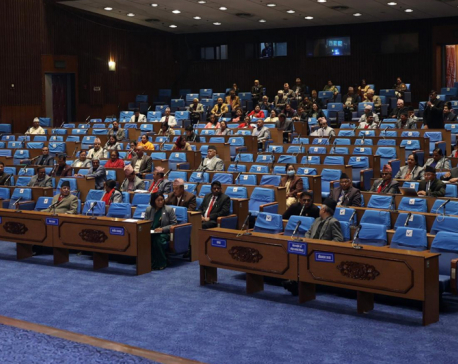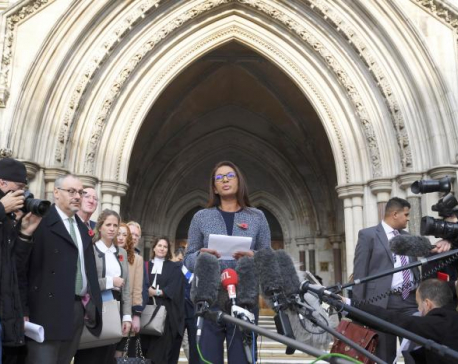
OR
Review the controversial bills
Published On: June 11, 2019 02:00 AM NPT By: Republica | @RepublicaNepal
Protests have been going on against many of the bills registered in the parliament. The government seems resolute to pass them but this approach of bulldozing the bills will not only deprive the Members of Parliament (MPs) of extensive deliberation and discussion on the provisions of the bills, which is the major duty of the lawmakers, but also prove that the government is indeed becoming authoritarian. This is the approach the government must avoid but it has not shown any indication of being accommodative of public concerns. The escalating protests against Guthi bill and use of force against the protestors clearly demonstrate this. On Sunday, scores of protesters demonstrated in Kathmandu demanding revision of Guthi bill. They argue that the bill, in current form, has the provisions that allow the government to capture the Guthi lands preserved for centuries. Instead of calling on the protestors for dialogue, the government mobilized police which used water cannon to disperse the Guthi supporters at Maitighar Mandala. The main issue seems to be with the proposed provision of forming an ‘authority’ to manage Guthis, which are currently being managed by the Guthi Sansthan [trust]. And main contention is related to the possibility of land mafia misusing the Guthi lands and other properties. The government has not been able to explain how this won’t happen. Under Guthi Sansthan, there are 2,335 public Guthis, managed by the locals for centuries. Fear among the protestors is the bill, once passed into a law, will render existing Guthis powerless, thereby impacting the cultures preserved by local communities for ages.
Even the lawmakers from ruling Nepal Communist Party have objected to these provisions and demanded a review of the bill. On Monday, opposition lawmakers obstructed the House proceedings protesting Sunday’s arrest and police action on Guthi activists. There is a consensus among lawmakers that Guthi bill is indeed against age-old traditions and cultures maintained by the local communities. Any provisions against our cultures need to be amended. Our constitution has guaranteed preservation and protection of cultures of all communities. Article 32 of the constitution has clearly mentioned that “each community living in Nepal shall have the right to preserve and promote its language, script, culture, cultural civilization and heritage.” Likewise, Article 290 states that federal parliament shall make laws concerning the rights of the Guthis [trusts], without prejudice to the fundamental norms of Guthis [trusts]. Any legal provisions to the contrary ipso facto become unconstitutional. Thus the government should hold talks with the protesting communities and heed their concerns to find the solution.
Guthi bill is only one example. As a matter of fact, around half a dozen controversial bills are registered at the Parliament Secretariat. Media Council Bill and bills on National Human Rights Commission, Security Council, among others, have drawn criticism from civil society, media fraternity and general public. Journalists have been staging protests against Media Council Bill and human rights activists have accused the government of trying to render National Human Rights Commission toothless. The government looks determined to push through these bills while the opposition party has threatened to stop them by all means. This will invite confrontation between the government and opposition party. The confrontation course must be avoided. The wise move of the government would be to amend these controversial bills through discussion with concerned stakeholders. A law that does not protect citizens’ rights will not only be hard to implement but will also be rejected by the citizens.
You May Like This

Proposals for amendment of 79 laws
KATHMANDU, May 12: The government has introduced some Nepal Act amendment bills that attack the very essence of the Criminal... Read More...

Prime Minister, tell us the truth
Prime Minister KP Sharma Oli seems bent on misinforming people to hide inefficiency of his administration which is already failing... Read More...

UK court says parliament must have Brexit say, dealing blow to government
LONDON, Nov 3: England's High Court ruled on Thursday that the British government requires parliamentary approval to trigger the process of... Read More...






Just In
- CM Kandel requests Finance Minister Pun to put Karnali province in priority in upcoming budget
- Australia reduces TR visa age limit and duration as it implements stricter regulations for foreign students
- Govt aims to surpass Rs 10 trillion GDP mark in next five years
- Govt appoints 77 Liaison Officers for mountain climbing management for spring season
- EC decides to permit public vehicles to operate freely on day of by-election
- Fugitive arrested after 26 years
- Indian Potash Ltd secures contract to bring 30,000 tons of urea within 107 days
- CAN adds four players to squad for T20 series against West Indies 'A'












Leave A Comment